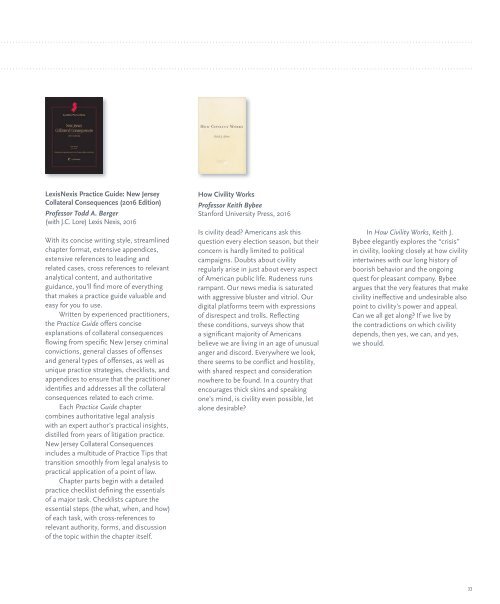DEAN CRAIG M BOISE
2hTIcqH
2hTIcqH
You also want an ePaper? Increase the reach of your titles
YUMPU automatically turns print PDFs into web optimized ePapers that Google loves.
LexisNexis Practice Guide: New Jersey<br />
Collateral Consequences (2016 Edition)<br />
Professor Todd A. Berger<br />
(with J.C. Lore) Lexis Nexis, 2016<br />
With its concise writing style, streamlined<br />
chapter format, extensive appendices,<br />
extensive references to leading and<br />
related cases, cross references to relevant<br />
analytical content, and authoritative<br />
guidance, you’ll find more of everything<br />
that makes a practice guide valuable and<br />
easy for you to use.<br />
Written by experienced practitioners,<br />
the Practice Guide offers concise<br />
explanations of collateral consequences<br />
flowing from specific New Jersey criminal<br />
convictions, general classes of offenses<br />
and general types of offenses, as well as<br />
unique practice strategies, checklists, and<br />
appendices to ensure that the practitioner<br />
identifies and addresses all the collateral<br />
consequences related to each crime.<br />
Each Practice Guide chapter<br />
combines authoritative legal analysis<br />
with an expert author’s practical insights,<br />
distilled from years of litigation practice.<br />
New Jersey Collateral Consequences<br />
includes a multitude of Practice Tips that<br />
transition smoothly from legal analysis to<br />
practical application of a point of law.<br />
Chapter parts begin with a detailed<br />
practice checklist defining the essentials<br />
of a major task. Checklists capture the<br />
essential steps (the what, when, and how)<br />
of each task, with cross-references to<br />
relevant authority, forms, and discussion<br />
of the topic within the chapter itself.<br />
How Civility Works<br />
Professor Keith Bybee<br />
Stanford University Press, 2016<br />
Is civility dead? Americans ask this<br />
question every election season, but their<br />
concern is hardly limited to political<br />
campaigns. Doubts about civility<br />
regularly arise in just about every aspect<br />
of American public life. Rudeness runs<br />
rampant. Our news media is saturated<br />
with aggressive bluster and vitriol. Our<br />
digital platforms teem with expressions<br />
of disrespect and trolls. Reflecting<br />
these conditions, surveys show that<br />
a significant majority of Americans<br />
believe we are living in an age of unusual<br />
anger and discord. Everywhere we look,<br />
there seems to be conflict and hostility,<br />
with shared respect and consideration<br />
nowhere to be found. In a country that<br />
encourages thick skins and speaking<br />
one’s mind, is civility even possible, let<br />
alone desirable?<br />
In How Civility Works, Keith J.<br />
Bybee elegantly explores the “crisis”<br />
in civility, looking closely at how civility<br />
intertwines with our long history of<br />
boorish behavior and the ongoing<br />
quest for pleasant company. Bybee<br />
argues that the very features that make<br />
civility ineffective and undesirable also<br />
point to civility’s power and appeal.<br />
Can we all get along? If we live by<br />
the contradictions on which civility<br />
depends, then yes, we can, and yes,<br />
we should.<br />
33


